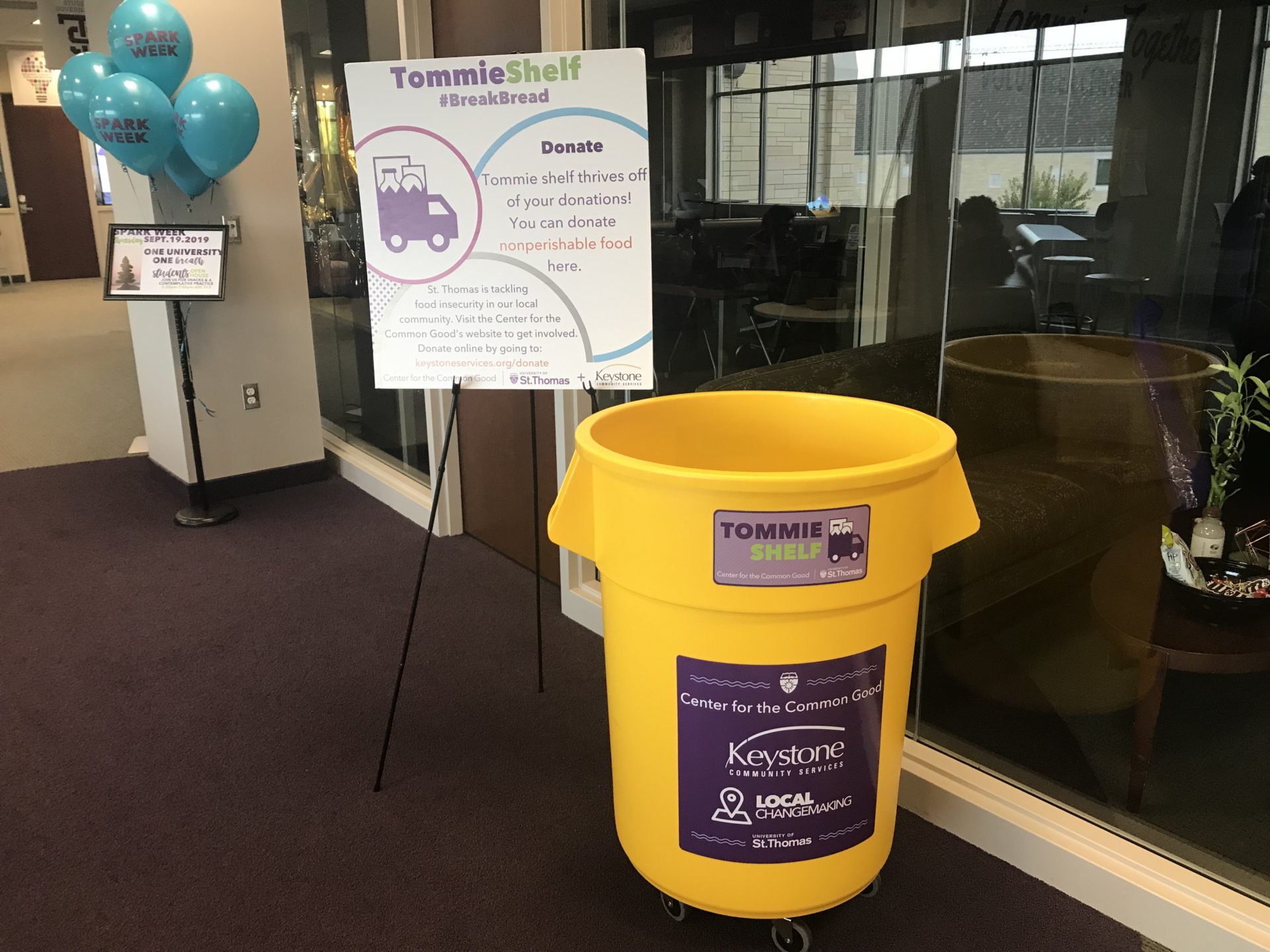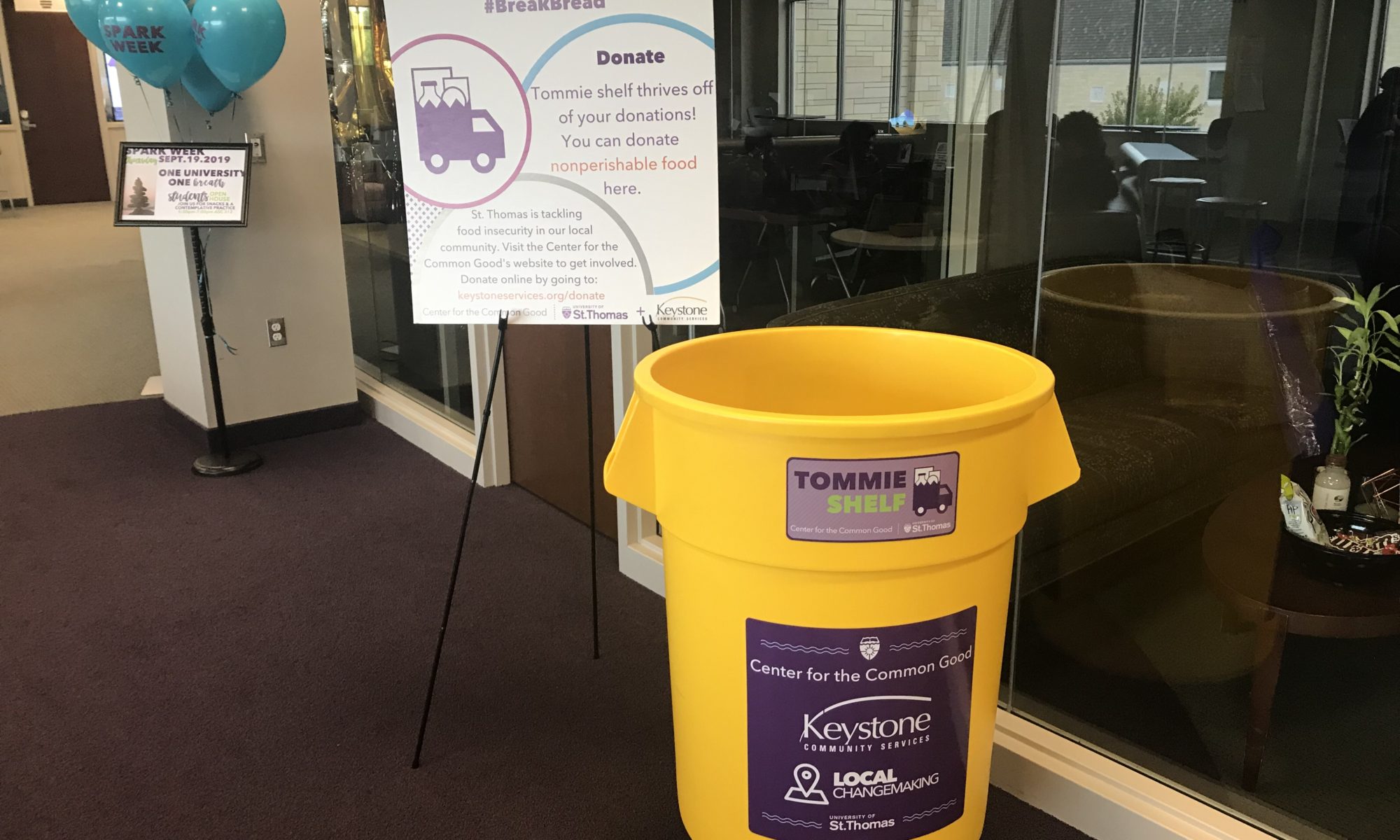
The Tommie Shelf bin sits inside the Sunberg Leadership Center. Students have donated nonperishable food items to this bin. (Rachel Torralba/ TommieMedia)
In an effort to address food insecurity, St. Thomas students and the surrounding community will be able to receive a bag of groceries at the new Tommie Shelf every month.
Instead of creating its own food pantry, St. Thomas decided to work with Keystone Community Services, a local nonprofit that delivers food.
Innovation and Changemaking Director Hill-Muñoz said the St. Thomas community has the privilege, funds, and resources to donate food and funds back to Keystone. The Keystone food mobile arrives the first Tuesday every month near the Anderson Parking Facility.
“The qualifications are very minimal. Like do you not know where your next meal is coming from? Do you struggle to afford buying groceries?” Hill-Muñoz said.
“We need to address food insecurity head on,” Hill-Munoz said. Hill-Munoz also said that food insecurity shouldn’t come with “baggage of shame.”
According to Hill-Muñoz, food insecurity has been a local need for years.
“I think often times students joke like, ‘oh I’m a poor college student,’ but that’s real for a lot of people–not having enough funds is real,” Hill-Muñoz said. “Having a resource that gives opportunity for that… is better than having something that people have to go ask for.”
The idea of the Tommie Shelf came about when Dean of Students Linda Baughman recognized the need for a food shelf on campus. Theresa Ricke-Kiely, executive director for the Center for the Common Good, and Baughman researched the best way to bring a food shelf to the St. Thomas campus by looking at what other universities were doing.
They worked with business professor Kim Sovell to develop a marketing concept for the food shelf with students.
“Before the food shelf became a reality, we asked (Sovell) to actually engage her students in working on different themes and what marketing could look like. And one of those themes was Tommie Shelf,” Ricke-Kiely said.
After all of the research, they found that the best way to address food insecurity on campus was through a mutually beneficial relationship with Keystone. Before the mobile comes, yellow bins are set out for people to donate nonperishable food items to Keystone.
St. Thomas senior Rose Brakob donated fresh produce to Keystone as part of working with Brightside Produce.
“I think there’s a lot more college students around that maybe struggle to get groceries,” Brakob said. “For those people, it’s very important to be eating enough. It’s also very important to your learning to be fed enough and to have the right nutrition to think right and be alert.”
Brakob used the Tommie Shelf in July when she was struggling to access groceries.
“The people there really want you to have food,” Brakob said. “They’re really helpful and really willing to work with you.”
Baughman used to add meals to students’ ID cards to give them access to meals until they are food stable. Students could come to the Dean of Students office and say they needed help with getting food. Faculty members or Health Services would also help refer students.
“It takes courage for a student to come in, and that’s a hard thing to do. To come in and say I’m hungry. I don’t have enough food,” Baughman said.
Due to the stigma surrounding food insecurity, one potential issue they ran into was wondering if a food mobile would be too public.
“We had this big period of we have no idea if students would come,” Baughman said.
After talking with Keystone, they found that a public food mobile was working in other places.
“We piloted it last spring and ran out of food the first time,” Baughman said. “There were over 40 students that came.”
Part of the research done at the first Tommie Shelf was to help students connect and find resources.
“We have students who are food insecure, and we have students at St. Thomas who are financially struggling to be here. It’s a huge sacrifice for them; for their families to be here.” Baughman said. “I think there’s a stereotype of our student body and the reality is we have a lot of students who don’t fit in that stereotype.”
Feeding America reports about 12% of people are food insecure in Hennepin and Ramsey counties. National statistics show 41% of four-year college students reported being food insecure.
“There’s something wrong when somebody has to figure out do I buy books or do I buy food?” said Ricke-Kiely. “As long as we have the need, we’re going to continue to do it and try to get people resources.”
Rachel Torralba can be reached at torr3544@stthomas.edu.



